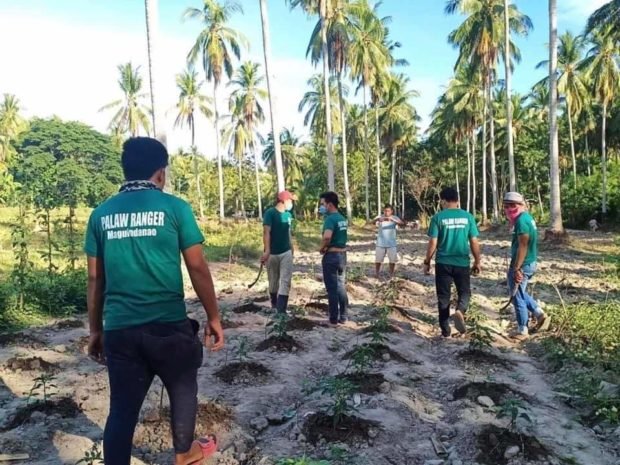
FOOD SECURITY Former combatants of the Moro Islamic Liberation Front are now at the forefront of helping ensure food security in the Bangsamoro region through the survival gardens they cultivate.—PHOTO COURTESY OF THE BARMM ENVIRONMENT MINISTRY
KORONADAL CITY, South Cotabato, Philippines — Combatants of the Moro Islamic Liberation Front (MILF), who were decommissioned under a 2014 peace deal with the government, are now on another front: establishing survival gardens as part of the country’s war against the new coronavirus disease (COVID-19).
Survival gardens are now sprouting in various locked-down Mindanao localities to help ensure the supply of vegetables in their areas as the nation grapples with the impact of the pandemic.
Several local governments have already included vegetables in their relief packs — usually consisting of rice, canned goods and noodles — to boost the nutrition of beneficiaries.
In the Bangsamoro Autonomous Region in Muslim Mindanao (BARMM), the former rebels, now working as palaw (forest) rangers, have been cultivating gardens inside forestlands, their lairs when they were still fighting the government.
“This survival garden will serve as another source of food for the region’s constituents, helping them ease the shortage of food supply,” said BARMM Executive Secretary Abdulraof Macacua. The Bangsamoro region, home to around 4 million people, covers the provinces of Maguindanao, Lanao del Sur, Basilan, Sulu and Tawi-Tawi.
Macacua, who is also the region’s environment minister, said he had directed agency personnel to set up food production areas in the forests that are suitable for vegetables and short-term crops.
According to him, the cultivation of survival gardens is decreed in Republic Act No. 11469, or the Bayanihan to Heal as One Act, which granted President Duterte additional powers to combat COVID-19.
‘Bahay Kubo’ vegetables
Outside the Bangsamoro, the town of Tampakan in South Cotabato province, known for its huge untapped copper and gold minefield, recently cleared a stretch of land in the mountain village of Tablu for planting vegetable crops.
Tampakan Mayor Leonard Escobillo said a water system had been installed on the farm, which was also being considered as an agritourism site.
“The municipaity plans to plant crops mentioned in the Philippine folk song “Bahay Kubo” (Nipa hut) in Tablu, whose climate is suitable for vegetable farming. These include ginger, radish, squash, turnips, string beans, onions and tomatoes.
Escobillo said the local government purchased the vegetables of local farmers and market vendors for inclusion in food packs that were earlier distributed to the communities.
South Cotabato Rep. Ferdinand Hernandez also allotted funds to purchase the harvest of vegetable farmers in the highland town of Lake Sebu, for distribution in the lowlands. The farmers’ crops had kept piling up due to lack of buyers amid the lockdown imposed in the province and nearby areas.